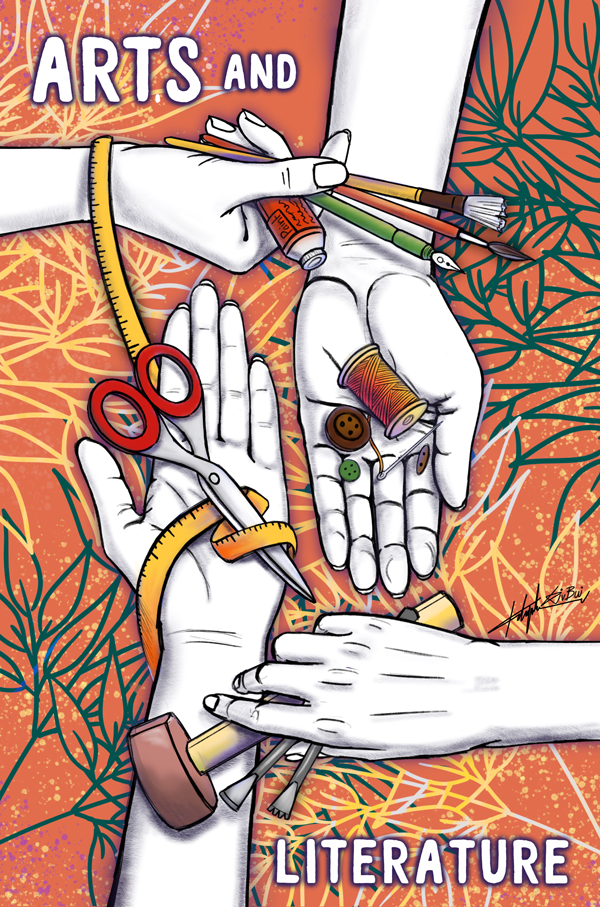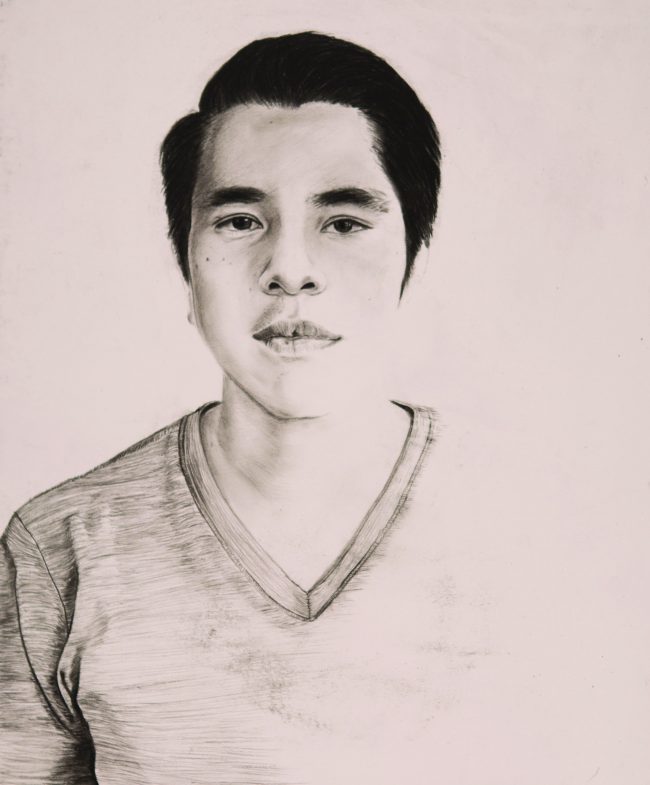Hedy Torres has been working on Invisible Hands: Eleven Million project as a Master Student at CSUN. She divided the body of work in three series, paintings, drawings, and time-lapse videos. The project in general elevates and commemorates undocumented immigrants living in Los Angeles and majority of them are DACA recipients. The portraits are made in various mediums among oil on canvas, charcoal on paper, and digital drawings. In the process of each piece, she meets with her prospect subject in their favorite spot or a coffee shop and makes them feel comfortable. They talk while she is studying their facial features by drawing them in her iPad pro. When she finishes the drawing study, she starts her interview.
Artists in this issue (alphabetical order):
Alicia Gabrielle Puzon
Allison Diaz Ramirez
Baillie Puckett
Edward Nenedzhyan
Hedy Torres
Ileen Esquivel
Iris Peretz
Ivan Salinas
Jacqueline Molina
Jessica Gallardo
Kiv Bui
Laurenze Dela Luna
Margaret Duggan
Mariela Camacho
Marylin Hightower
Nicolo Requiestas
Sarah Dutton
Shirin Raban
Tirsa Delate
Xavier Fierro
Our Art by Ivan Salinas
¿Quién eres?
¿Qué ha cambiado?
What are you focused on?
What is your story about?
The fifth question is still pending.
I am
one of…the kids of the south
who remain resilient
against the aftermath of merging worlds.
Our standards have changed:
The Babylonian God and her Madonna has evolved.
Our Boylesque idols are drenched in gold
and all violence is sponsored by Walmart.
Coming home for a cleanse
away from the pink moonlight
focused on our dream to touch the sky
in hopes someone will see
the citrus of our creativity.
Our art, pieced together, tells the story
behind our culture
a story of rebellion and resistance.
Ivan Salinas is the Culture editor at The Sundial
Short Stories
Sponsored by Walmart by Baillie Puckett
Buying a ticket for a night out comes with a clause. A clause that lets you know that the country was allowing you fun but you still belonged to the country. The country owned your life. A night out meant that there was always possibility that you might lose your life.
We knew it before the government officially implemented the system. Go see Batman? Dead in Colorado. Go to a gay nightclub? Dead in Florida. Go to a concert? Dead in Nevada. Go to school? Die in Texas. We as a society accepted mass murder as the norm as soon as we decided that even the death of children is a trauma we can overcome. It became official. The government began making money off our massacres.
At first, it sounded like a joke. Surely, there was no way for it to be true? Yes, gun stocks rise after massacres. And yes, the government was making money by keeping guns in the hands of shitty people. But was that reason enough to monetize tragedy? Apparently so.
Our lives became commodities that would promote the sales of gun stocks and life insurance. Companies outbid each other to sponsor the next event. And as a result, large public events were essentially privatized. Only corporate-sell-outs continued with the mainstream pursuit of their craft. If your event was lucky and wasn’t chosen, you made money off the thankful crowds who buy merch to celebrate their lives. If your event was lucky and was chosen, you made money from the companies that sponsored the slaughter. Greed is pivotal to your success.
You never know if your event will be chosen until it’s too late. You’ll be screaming along to a song, anxiously awaiting actors to kiss, or dancing with someone you maybe wanna take home when the sound goes out. Silence fills where there’s supposed to be noise.
Then a cheerful, automated voice fills the room and everybody’s blood goes cold. And everybody in that instance remembers the clause of their night out. Yet many still hesitate before dropping to the ground. It’s that hesitation that costs many their lives. Gunfire, like fireworks, will explode. Bloody, miserable, fireworks. But before, a sponsorship plays; the last thing you hear before you stop breathing, an advertisement by the people that paid to kill you.
First Broadcast rights belong to Fox News. Inquiries for footage should be forwarded to their press office.
Tonight’s event has been sponsored, in part, by Walmart.
Save Money. Live Better. Walmart.
Baillie says she spends her free time writing, but she’s more guilty of writing tweets than writing her manuscripts; the tweets aren’t even that good. She reads young adult fiction across genres and hopes to become an editor in that demographic (and perhaps a better tweeter) after graduation. Her favorite things include procrastinating until the last possible minute and binge-watching Law & Order: CI. }
God, if you’re there, give me a second chance by Alicia Gabrielle Puzon
I.
Adrian could still remember the first time it happened.
He had gotten into an argument with Luna, and it took everything in him to remain stoic at the sight of her stricken face. According to her his heart had long frozen, leaving him a cold, unfeeling robot. Maybe she was right, he thought. The marriage was going nowhere.
By the time their fight reached its peak, Luna stormed out of the house in a rage so unlike her usual meekness. He promptly ran after her, his rising panic spurring him onward.
When he reached the crossroads, all he could see was red. He saw the red of traffic lights, the red of the blaring sirens, and the red of his wife’s blood, pooling around her slumped form in the middle of the road.
“Yeah, officer. I saw her running across the road, then boom. The truck went by and hit the poor lady.”
This isn’t real.
“I regret to inform you of your wife’s passing. My deepest condolences.”
None of you are real.
“I’m so sorry, Adrian.”
By the time I open my eyes, all of this will disappear and everything’ll go back to how it was.
One.
“…So, we’ll have to start preparing for her funeral as soon as possible—hey!”
Two.
“Get a hold of yourself, Adrian!”
Three.
II.
The second time it happened, he was in their shared bedroom. He took a few moments to stare at the ceiling before he noticed the sound of running water. She was probably in the bathroom, he supposed.
Still, the gnawing pit in his gut wouldn’t go away unless he saw her smiling face again, so he knocked on the door.
“Luna?”
No reply. He knocked again. She still didn’t respond.
He grew even more worried. Taking a deep breath, he mentally prepared himself for the next step.
“I’m coming in.”
She laid there in the bathtub with her head lolled to the side. Her bloody wrists were the first things that caught his attention. He ran to her, and all he could do was whisper apologies he knew would never reach her.
“I’m sorry, I’m so sorry, I’m—“
A failure.
III.
He figured he’d get it right the third time. In his office, he sat face-to-face with his monotone computer before he felt the buzz of his cellphone.
Before answering it, he checked his finger to make sure his wedding ring was still there. Despite its dull, almost pathetic glint, Adrian wanted to hope.
“Hello, Adrian here.”
“Adrian!” the voice on phone yelled, frantic. “It’s Luna, she’s—“
“What about my wife?” His voice was louder than usual and had a tinge of desperation.
“A child bumped into her during the morning commute. She… fell onto the train tracks while the train was approaching—”
Is this my punishment?
“—her body is currently being recovered at the train station. I’m very sorry for your loss— “
Adrian never got to hear the end of the sentence after throwing his phone across the room.
I’ll get it right next time. It has to be. It has to be—
VII.
He’d already stopped feeling surprise whenever he’d find out the news, but the pain still stung. Every time somebody tried to offer some sort of sympathy to him, he’d just walk past them.
XII.
Sometimes, he’d tally the number of times she died in his arms versus the number of times she got into an accident. He didn’t know which one hurt more.
XX.
How many times had he done this? It didn’t matter. Things ended up the same, anyway.
She’d always die in married to him. Adrian never thought he’d loathe the word “always” with so much fervor.
LXV.
Scientifically speaking, he should’ve been numb to the pain by now. He’d been conditioned to accept agonizing scenario after agonizing scenario, so why did he still feel an ache every time he failed?
C.
He fondly thought back to their first night. She still looked immaculately beautiful now, even in her coffin.
D.
Five hundred times and he understood why Luna said his heart was frozen.
M.
Please stop smiling at me even after everything.
It’s making things harder for me.
???.
He has decided. After continuous trial and error, he has decided.
I don’t know how long I can keep failing, but I do know this—
I’m coming to see you soon, Luna.
Alicia Gabrielle Puzo, Journalism major is a second-year student at CSUN.
Alicia is an aspiring journalist who hopes to make a decent enough living to have a cozy apartment with two cats. Some of her hobbies include writing, nitpicking at her own writing, and sketching. The work she submitted is a small glimpse into what she makes on a productive day.
The Whore of Babylon by Edward Nenedzhyan
Wayfarers often wandered into the ghastly remains of Eden; beauty and eternal salvation left to rot amidst the ashes of divine wrath. Eden died long before apparitions swarmed the sprawling white of the undead vegetation, which, although perished, gleamed with an aura of bioluminescence, as if there remained residual life. This particular forager walked slowly, as if battling the very force of gravity that held him from giving into the vortex above the weeping world. Turbulent winds screeched in fury, gnashing against the frozen wastelands, pushing the wayfarer against the howls of distant voices in the bleak void ahead. He was on the periphery of rational conscience, each moment seeping further into wounds afflicted over the course of the journey to the marred wasteland that birthed mankind.
Far ahead of him was the holy mountain itself, the polyandrium of Noah’s compassion. Skeletons were said to have littered the summit of Ararat, the first remains after God’s chosen new beginning. Nakhichevan, the area south of the Arax River, was a sacred hallmark of the hillside tribes. Hayasa, warring against Nairi, warring against the Armeni, all in a perpetual standoff. Until the a cry came from the gallows of the peak. A lamentation arose, a harbinger for what was to come. Rather than compete, these three tribes sought unity, and within this harmony, they chose their ambassador. Three tribes at the river, and the traveler rode as an amalgamation of this trinity, the first king of this kingdom, seeking only an answer as divine as the pagan rituals of a tribe that collapsed in the distant past.
He stood in awe at the confluence at the Ararat basin, the green waters of the rivers shimmering in orange moonlight. Wolves sang to their deserted lovers among the hills, wails of longing reverberating through the valleys, only to be met with silence, and silence alone.
The voyager made his ascent with patience, creaking toward the light of the ice caps atop the frosted cliffsides. On the third day of his passage, he sought the crystalline fractyl bed that housed the celestial graveyard. He climbed upward, reduced to the futile layers of wool cloaking his body, and almost nothing else remained beside him. His compass, walking stick, all lost to the cause. Only his daughter’s wood carving was left, clutched tightly in his trembling, frostbitten hand. He glanced at the slab of wood, but was unable to see the drawing itself, yet he moved onward. As he trudged through waist deep snowfall, he slipped suddenly, tumbling into the crevice at the absolute pinnacle of the mountain. As he stood up, he saw it. Planks of wood strewn across the clearing within the permafrost, with only a single branch jutting out of the icy, infertile soil. The traveler walked forward to this branch, and upon further inspection, saw a single apple weighing it downward. He looked at his daughter’s wood carving, which had miraculously survived the descent. Understanding what must be done, the king drew in a deep, meditative breath, and reached for the apple, plucking it gently. Upon doing so, all wind ceased in a sudden disruption of spacetime, as if the world had ceased to be for only an infinite moment. All snowflakes fell simultaneously, and the branch slowly rose from beneath the ground, burgeoning into a great tree. Lush vegetation began to consume the summit, swallowing the inhospitable venoms of nature with it. As the garden began to live once more, the lone king glanced once more at his daughter’s wood carving, and he looked intently at it for the first and last time. He made note of the crude clouds and trees, the firmament in the corners, but he then looked at the center of the carving. The lone tree stood, carved with excruciating precision, and under the largest branch was whom he sought. The forked tongue of the snake hissed outward from within its scaly form, looking through the carving as if to pierce the traveler’s eyes. He turned his gaze away from the drawing, looking forward. And then it spoke.
Edwards is an exploratory major (looking into declaring journalism very soon). He is a freshman student at sun. He wanted to share a story that illustrates his Armenian heritage. This fictional story utilizes extensive imagery in order to figuratively showcase the Armenian cultural transition from Pagan beliefs to Christianity, all while subtly highlighting this transition through symbolism.
Illustrations & Paintings
Boylesque by Mariela Camacho
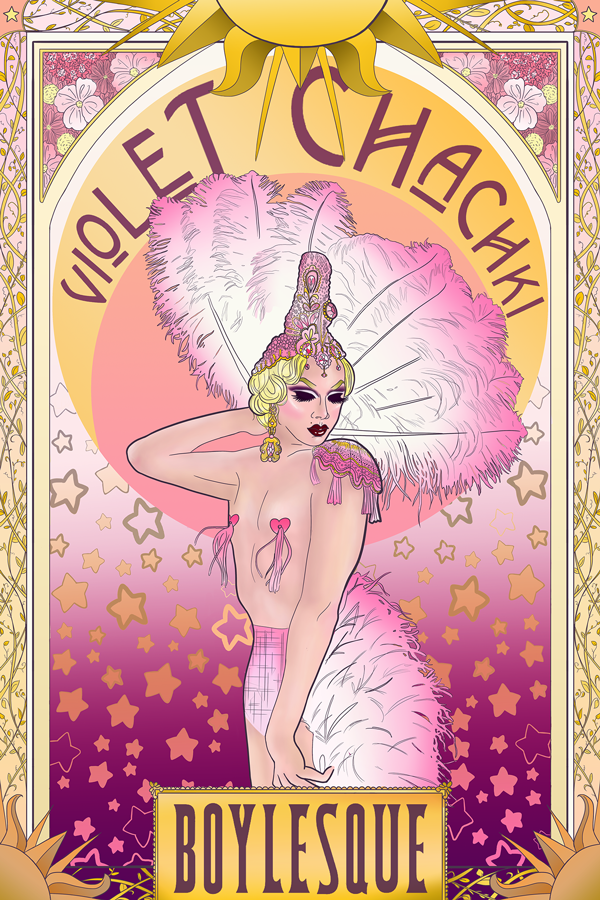
Mariela Camacho, senior art major, is focusing on illustration and paintings making feminist art. She also works on campus for Radius 2.0 and mentor students with Abriendo Caminos.
Citrus and Curls by Marilyn Hightower
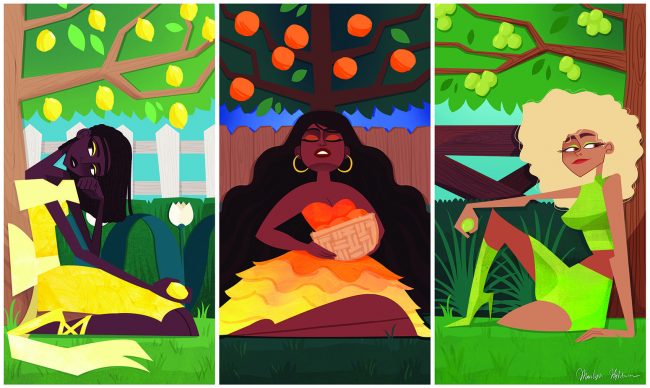
Marilyn Hightower, Art major, is a senior at CSUN. This piece was inspired by the idiom. “The fruits of our labor.” which is the result of one’s work and efforts. She is a young black woman who has struggled with her hair entire life–whether that would be accepting her hair for the curls they are, to hearing her curls from chemical damage, to treating her curls with every kind of oil there is. The piece is an homage to Black women and their lovely natural curls.
First Nation Survival, Resilience, and Resistance by Xavier Fierro
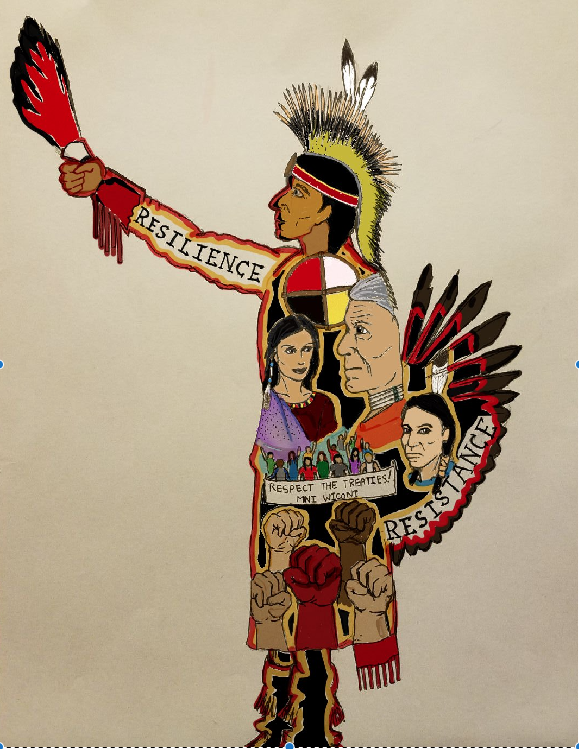
Xavier Fierro is a senior graduating Spring 2018 with a BA in Anthropology, with a minor in American Indian Studies. He is proudly multi ethnic and a US Marine Veteran. His favorite hobbies are hiking, drawing, and writing. His piece represents recent issues affecting First Nation people. It also stands for those at CSUN who fight back against the CSU Chancellor’s EO 1100 and 1110.
MERGING WORLDS by Margaret Duggan
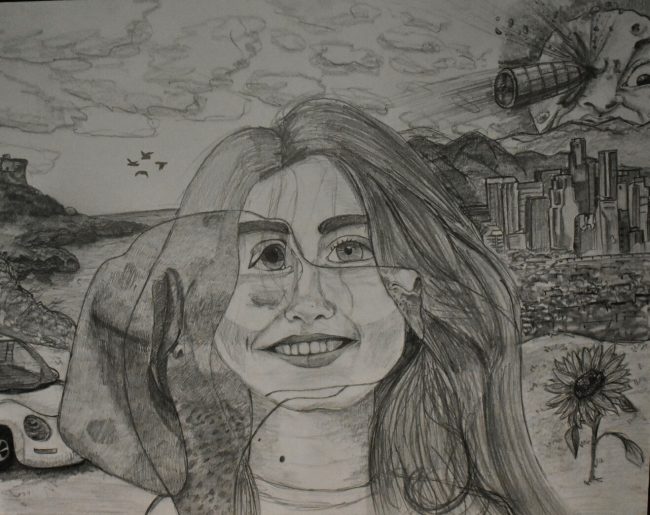
Margaret Duggan was born in Lecce, Italy. Coming from a half-Italian, half-American family, she decided to leave the country she was raised in to come to California and follow her aspiration of becoming a director and story artist for animation. She believes that animation is between her two biggest passions: drawing and movies. She is now a sophomore in Film Production with a minor in Animation. In her drawing, she wants to show the best of both of her worlds, Italy and California. Her faces crosses with the one of her dog, Kurt, who symbolizes her personality and the immense support she receives from her family.
Pink Moon by Jacqueline Media

Jacqueline Molina is a junior majoring in Art with a focus in Animation.This piece is based on memories; Nostalgia can make us remember things not as they were but how we wanted them to be. The more we remember, the less accurate our memories are, becoming smaller and changing color, until they are a different recollection completely.
The Fifth Question by Shirin Raban
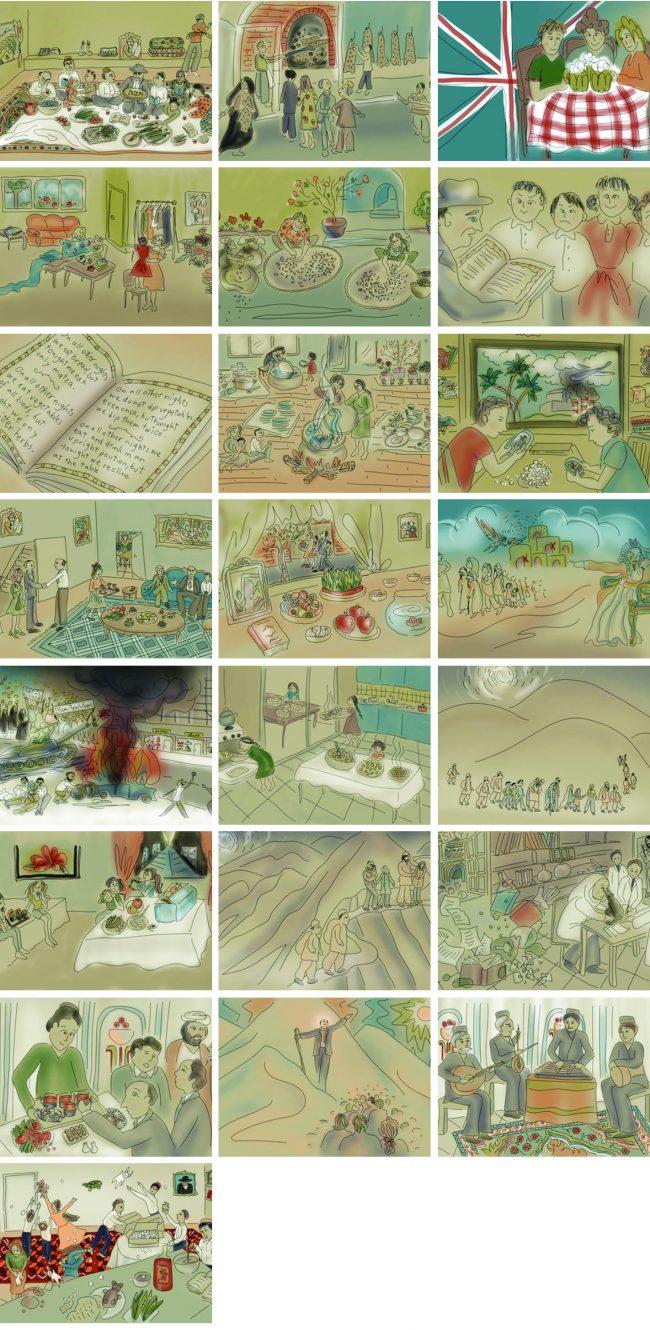
Shirin Raban is an award winning designer, cine-ethnographer and educator. She creates films that address the topics of identity, culture, art and education. She directed the short film, “VAPAE: The Making of a Teaching Artist” for UCLA Arts and Architecture. She received her Masters in Visual Anthropology from USC. She is Lecturer at CSUN and UCLA Extension, where she teaches courses in the practice and history of Graphic Design.
Touch the sky by Allison Diaz Ramirez
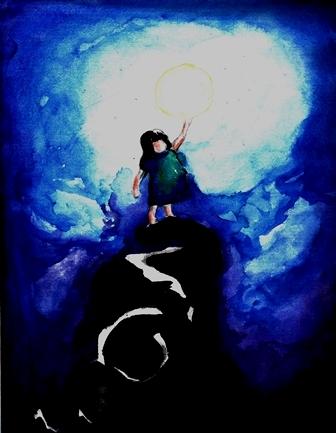
Allison Diaz Ramirez is a freshman majoring in Graphic Design. Her piece is inspired by persistence and the idea of finding the light at the end of the tunnel.
Homecoming by Jessica Gallardo
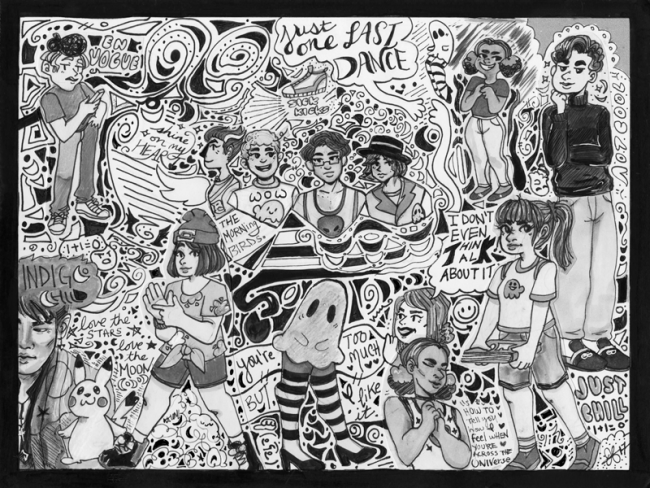
Jessica Gallardo is a first-generation college student. Her parents migrated from Mexico before she was born in hopes of giving her a better life and education. She made this collage full of characters, music, and imagery that she adores. She feels they express who she is as an individual because there is so much to sift through in the illustration. It’s an imprint of what runs through her mind throughout the year and she does one of these every ten months to immortalize it.
Hand of Fatima and Golden Idols by Iris P.
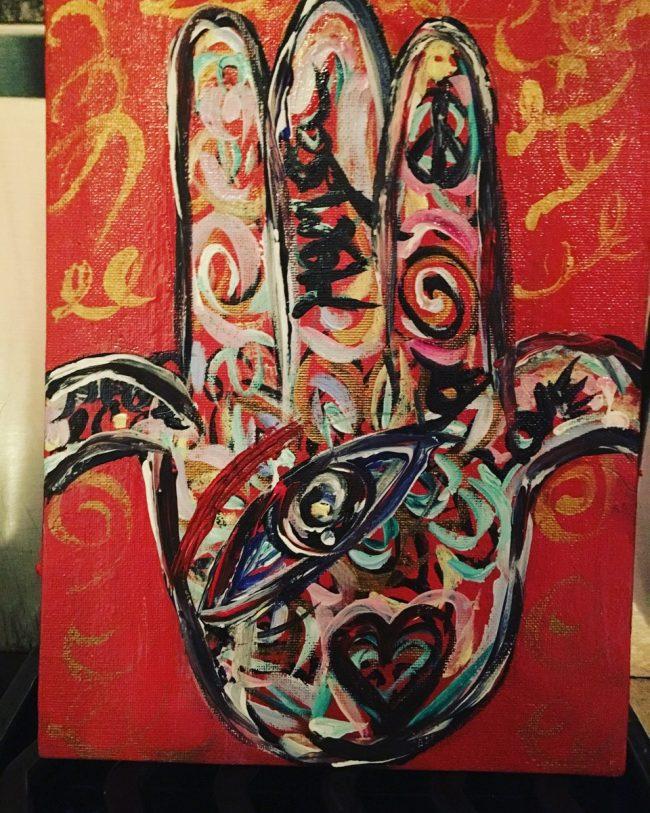
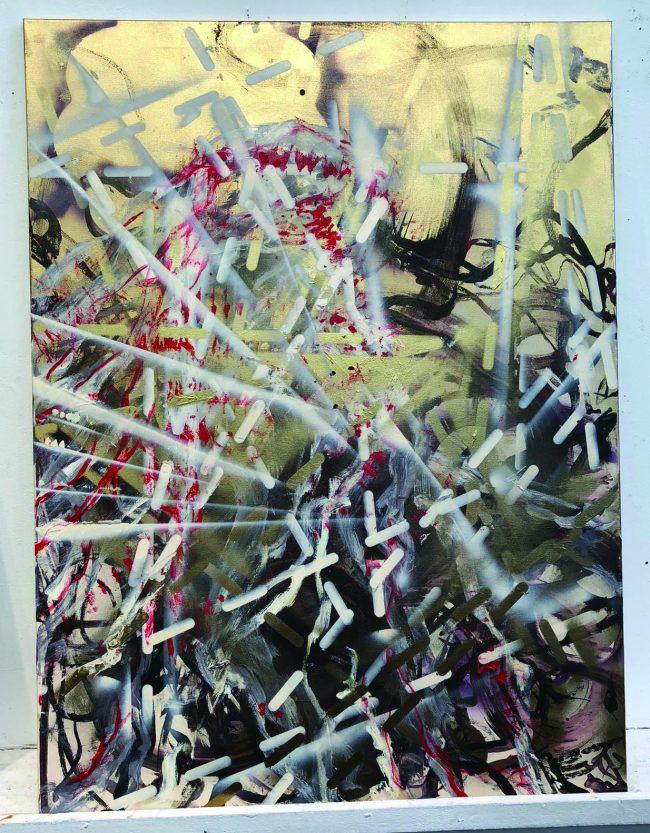
Iris P. uses the word yalla, meaning “let’s get going” in Arabic and Hebrew, to describe her practice of expressing emotion and meaning using imagery, recognizable and abstract emerging from her interesting culture. Iris P’s paintings are bold in size, color and brushstrokes. The childlike, playful nature is intentional and gives a feeling of sophisticated simplicity. Interested in culture, humanity and the sea, Iris P. always conveys a sense of energy and spirit.
One of… by Hedy Torres
Poetry
Kids in the south side by Ileen Esquivel
I want to write a poem for the kids that live on the south side that are late to class because they missed the public bus.
I want to write a poem for the teachers that work at the public schools with a judging eye. When we yawn in your class it’s not because you’re boring us to death with your fractions and formulas, it’s because when school is over;
One, some go play sports to avoid going to a home that doesn’t quite feel like a home.
Two, some take care of their brothers and sisters while their parents work the midnight shift to put food in our belly and shoes on our feet.
Three, we stay up as long as we need so our immigrant parents know that coming here was the right choice.
I want to write a poem for the 14 for the 15 for the 16 and for the 17 year old girls that can’t go out wearing shorts or revealing clothes whether it’s during the day or after the sun has hidden away.
Because the second we step out we will hear honking, whistling or the kissing sounds that sound like the hissing of a snake ready to poison you.
I want to write a poem for people looking into our city. Judging. But not lifting a finger to help. Because the problems from a city filled with immigrants and people of color aren’t as important as the problems from a white American living in a white home at Beverly Hills.
Because this is a city where boys join gangs and girls get pregnant at 16.
I want to write a poem for all the kids that need help but their parents also have bills to pay, and after all you’re just having a bad day.
A pill will keep the doctors away
A bottle will keep the pain away
A slit on the wrist will keep the tears away
And the music in your ears will keep the yelling away.
I want to write a poem for the kids that want to get out of the south side.
Despite your income, your parent’s citizenship, your mental state, and despite what people looking outside see, all they see is the surface, and not the pain, not the tears, not the bleeding hands of our parents
They don’t see the warrior inside of you that refuses to give up.
I want to write a poem for the kids that were told to give up because even if they made it to college there wasn’t enough money in the shoe box to give you a better opportunity.
This is for the kids that made it out of the south side, with a lit fire in their hearts that stayed alive.
Ileen Esquivel is a first-year student here at CSUN majoring in creative writing. She was raised in Pomona. Living in a low-income community was a struggle, so her poem meant to reflect the struggles her community faces. She began to write stories and poetry a year ago as a way to de-stress which led her to pursue creative writing. She intends to strive to become a college professor and/or a published author.
Standards by Laurenze De La Luna
Welcome to an era where we have to fight for our rights
Where people degrade one another based on what defines them
Believing that it is alright
A time where we are prone to violence
Based on the color of our skin
A time where we are praised for our appearances rather than our accomplishments
And are forced to have our bodies thin
A time where people stare at you for being who you are
Devouring on your imperfections and beautiful little scars
Keeping their mouth shut but letting their eyes alternatively talk
Secretly persuading you to follow where society walks
We have the critical statements being thrown at whatever you do
Forgetting you are human and you have feelings too
We have the concept of gender and the norms it beholds
Step outside the blue and pink boundaries
Even with your freedom, you are still yet controlled
Next we have stereotypical statements
Like the strength of a woman compared to a man
The ideal actions and aspects to be contained only by specified gender
Seeming like it will be strange stepping out of your labeled sticker
But in reality, it is normal if you can
As a person may find one thing to be gorgeous
And yet with another’s eyes it may not
We always have to remember everyone grew up in different environments
Proposing a variety in perspective and thought
The same proceeds with the religion and the ethnicity one holds
And the core values and beliefs that they unfold
We may perhaps agree and oppose
But the answer to why they abide to the significance
Is only an answer they know
We generalize and ignore to look between the lines
One wrong move and it seems like the mistake is signified
Upon the whole society of our kind
We then try to retract the labels that have been placed
But yet rumors spread quickly like a wildfire
And now discrimination is what we face
Being now known to be distinct from others and now ticketed as a disgrace
Without tracing back to the truth of it all to check the accuracy
Of the story or perhaps understanding the individual’s situation just in case
As our minds may ponder differently
Based on any subject the world beholds
We may find our emotions driving our actions
And sometimes the words and activities we present at such moment
Does not correspond and connect to us as an individual as a whole
As we do have temporary phases
Just like a relationship and its given course of time
Maybe just like the weather and temperature in an hourly basis
Or even the seasons
Proposing to us that nothing is ever stagnant
So we can not define things permanently or elaborate based on another person
Since we cannot even label something as “forevermore mine”
Our minds are full of assumptions
And we tend to conclude to answers very quick
We might say we are weak but yet so strong
And might say we will stop but yet go on
We might compare ourselves upon other people saying that we are low
But what we are comparing ourselves to
Is only the features that person decided to show
The information we are judging on is not fully describing the person
But instead acting on “What we see is what we know”
They may be smiling on the outside, but crying on the inside
Content with life, just to avoid the thought of being a burden to someone
So they state a lie
Hiding their true self behind a curtain until someone would realize
Our minds and personalities twist and collide
But sometimes it is influenced by another
Creating an alteration which contributes as an aspect to us being generalized
Secretly labeled and set into groups
Without full knowledge of stepping within each other’s shoes
It all starts off when we are born, with those pink and blue blankets
Our gender, ethnicity, and more
Not knowing even any information or life’s varying doors
We are already characterized into separate norms
Lent with the gift of automatic freedom
To be who we want to be and chase the choices in our dreams
Does not act like the definition
That we are prone to see
Standards of beauty, roaming around the air
Anything that seems to define you as an individual
Tends to have everyone aware
Standards of society, always seems to be there
Standards based on gender and how one should conform, seems to be unfair
Not understanding one another’s story and accepting who they individualistically
Leads to worldly despair.
Laurenze Dela Luna is a sophomore psychology major at CSUN. Her piece is meant to emphasize the negative aspects many are going through within the era, focusing primarily on one’s ethnicity, religion, gender, skin color, and sexual orientation, but all revolving around the main idea of society generalizing and holding assumptions.
Photography
Madonna by Tirsa Delate
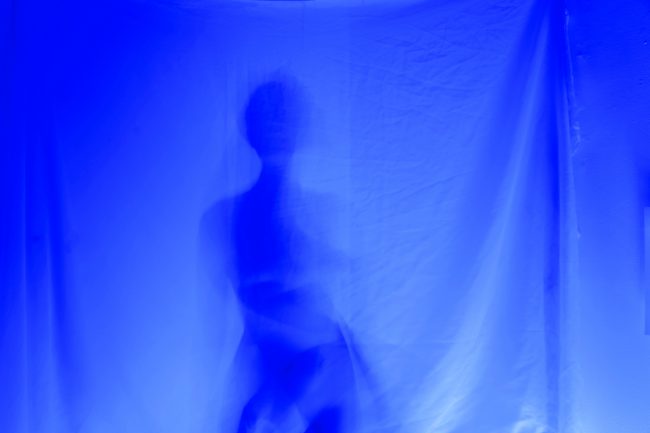
Tirsa Delate is a first year MFA graduate student at CSUN. Using her nude body and performance, her work explores personal and psychological experiences that acknowledges duality, ritual, feminism, gesture, sexuality, and manifestations of the gaze. In the present technological and social landscape, she explores implications of public nudity through live virtual performances.
Pieced together by Nicolo Requiestas
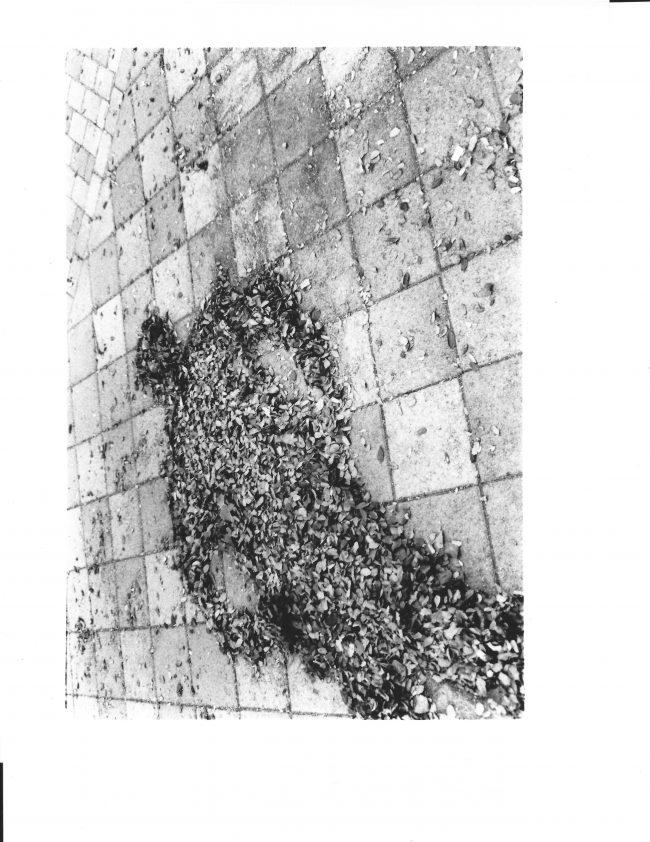
Nicolo Requiestas is a Filipino-American. She hasn’t particularly felt as if she fits in with both the general society: “Am I not American enough? Am I not Filipino enough?” She has come to terms that this is the beauty of her identity. She is the celebration of two cultures and shouldn’t be subjected to just one. Americans are multiple pieces in themselves and there is no harm in being proud and expressing it.
Home by Sarah Dutton

I burned my skin
to feel again
and through the cleanse
I found presence
You welcomed Me
Now
I See
We Are Free
Sarah’s poem deals with the themes of pain, rebirth, and liberation.
